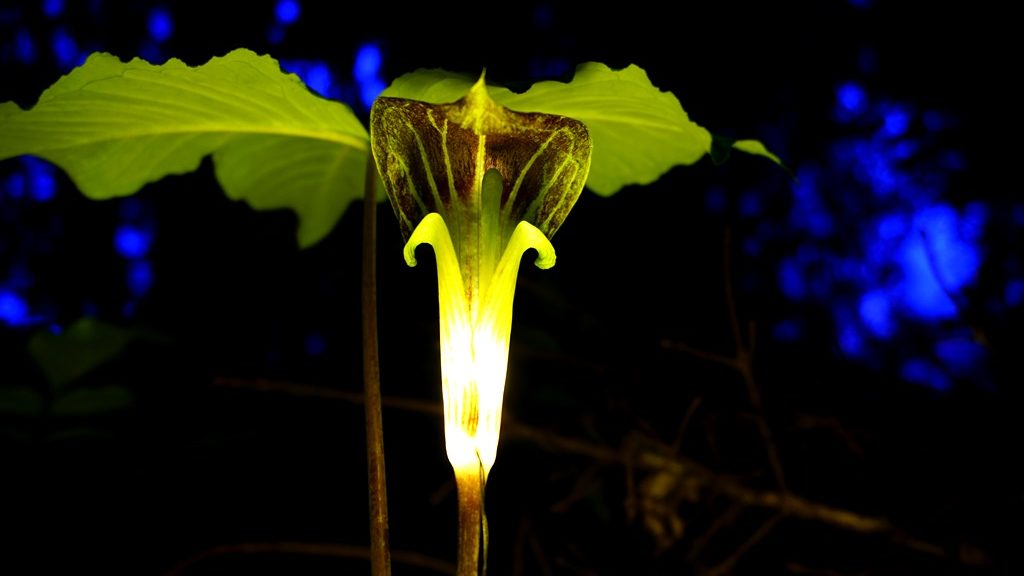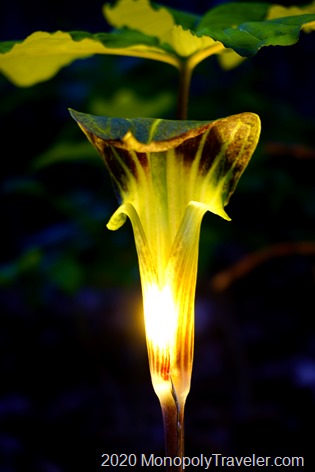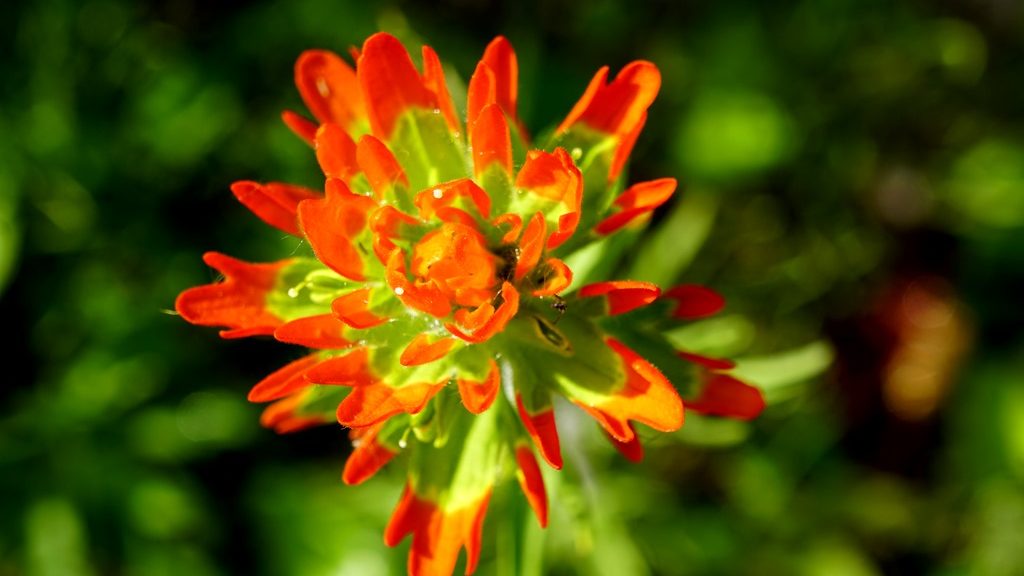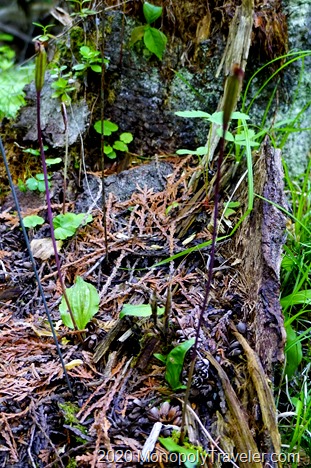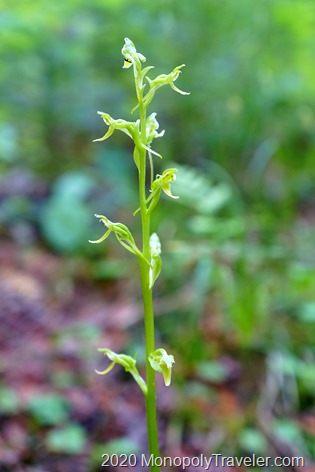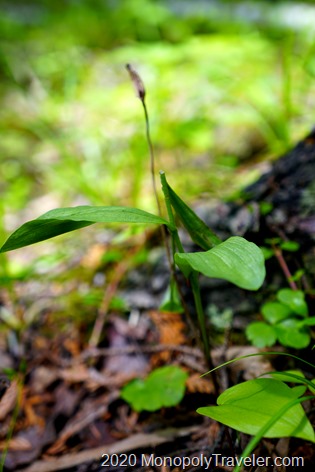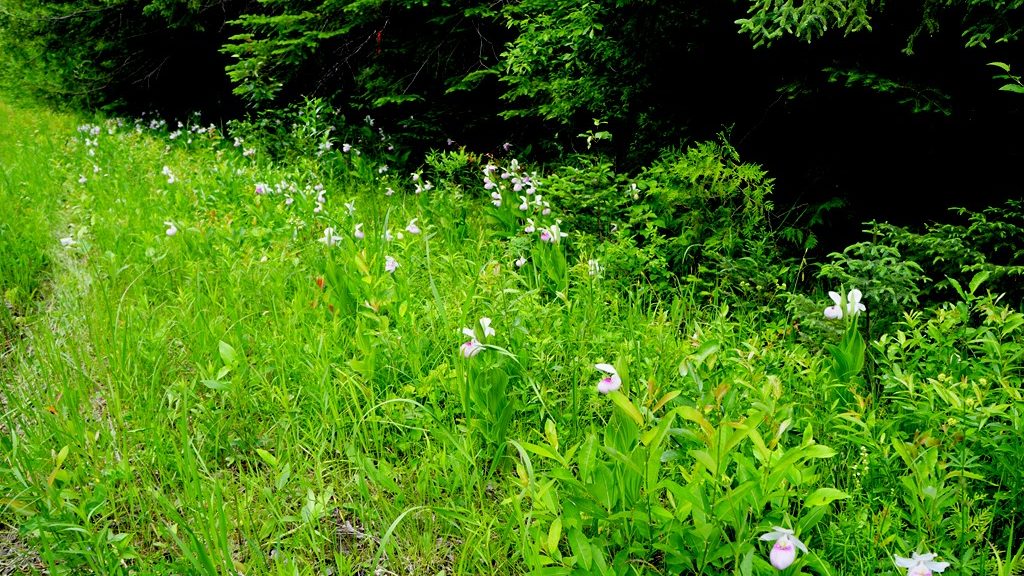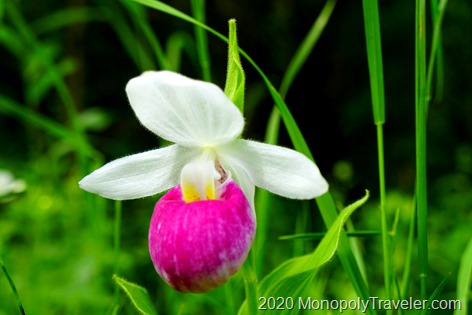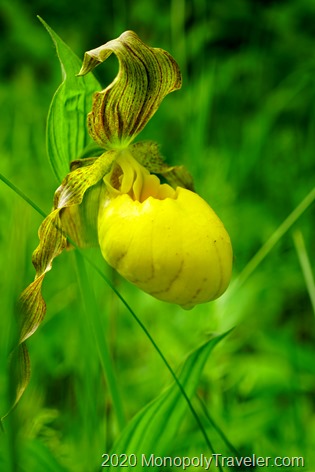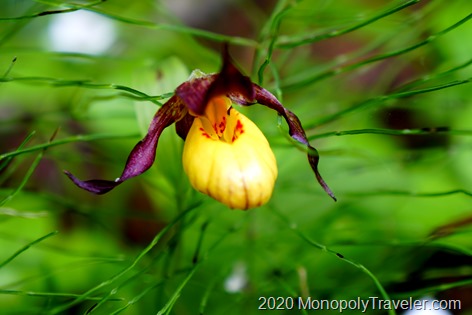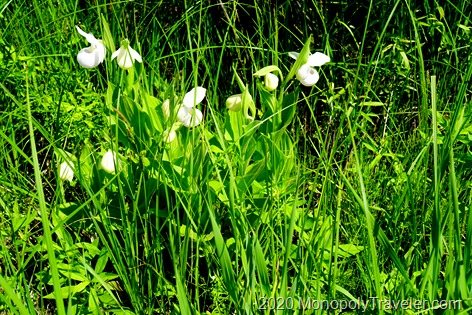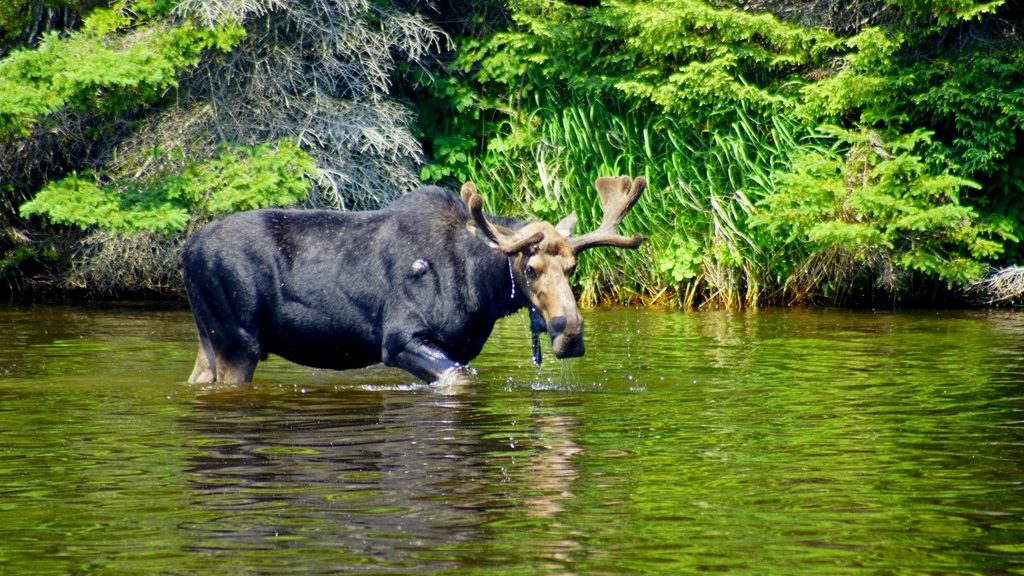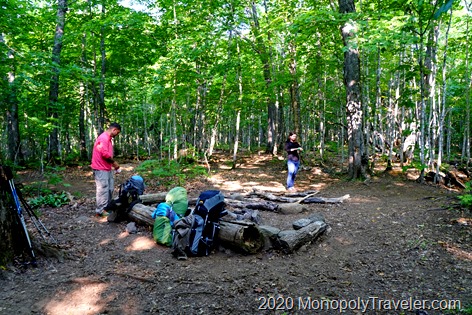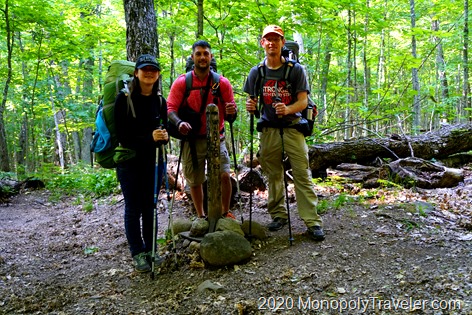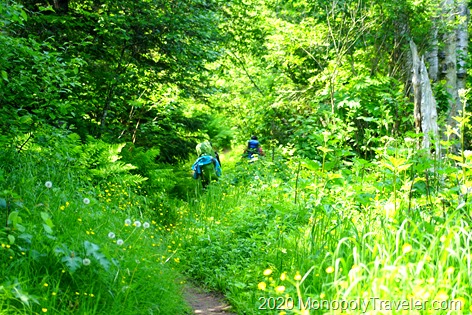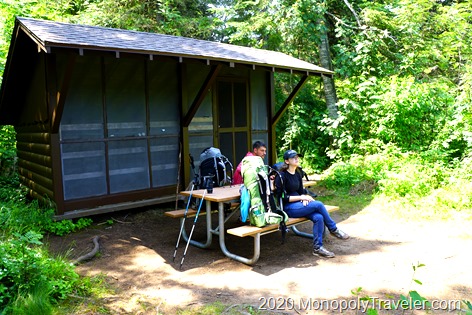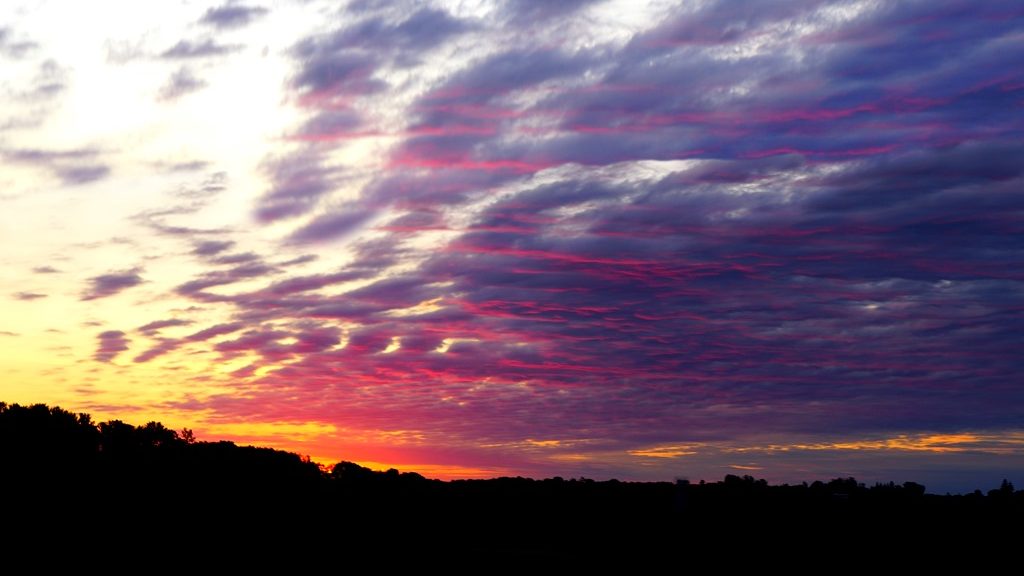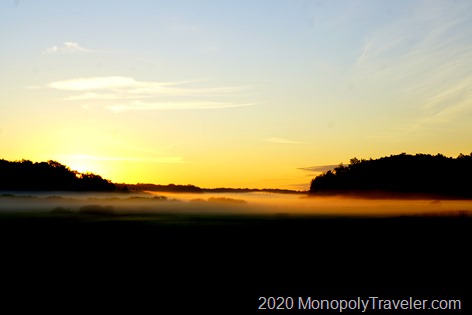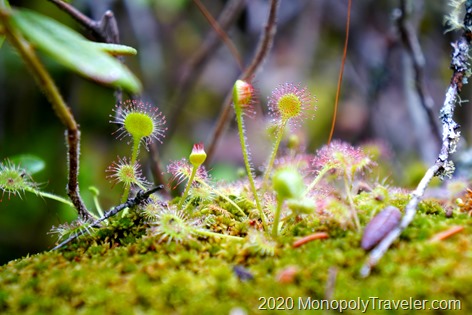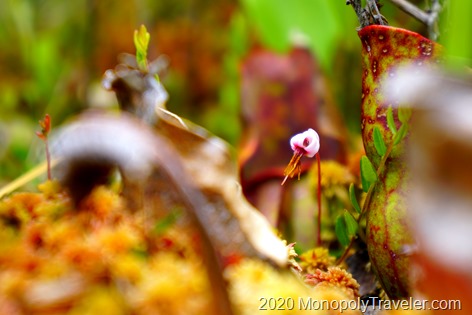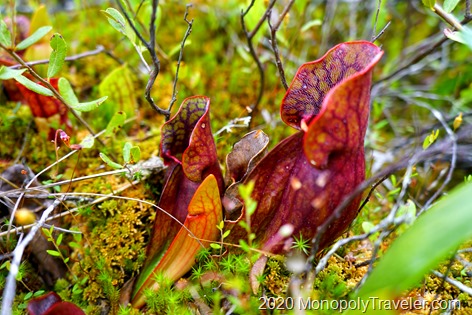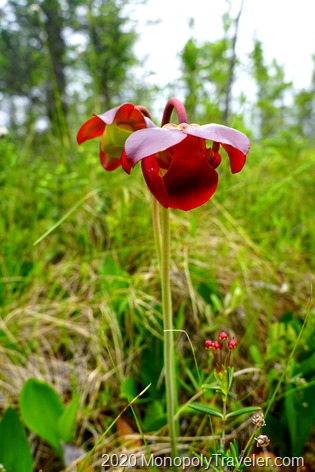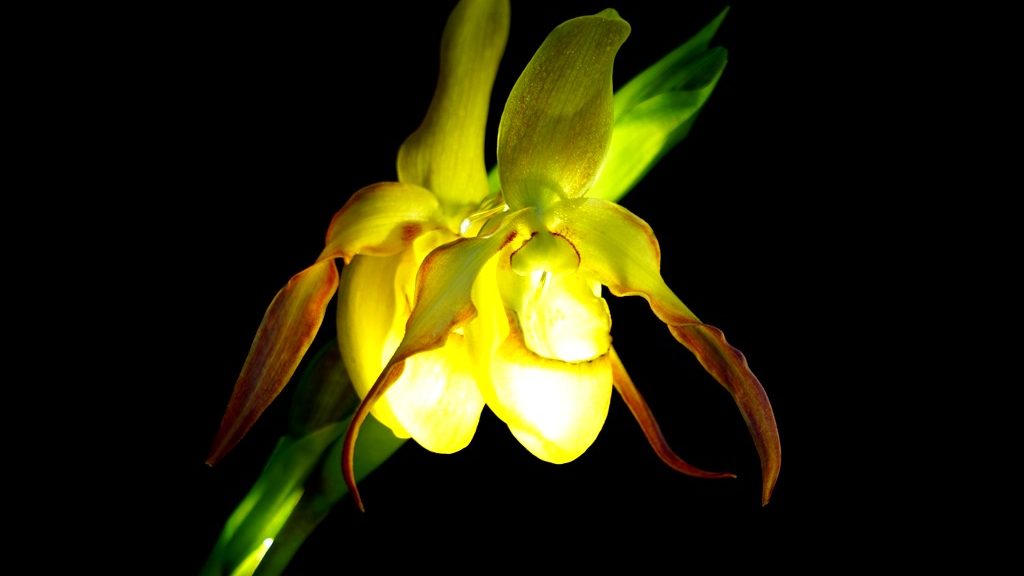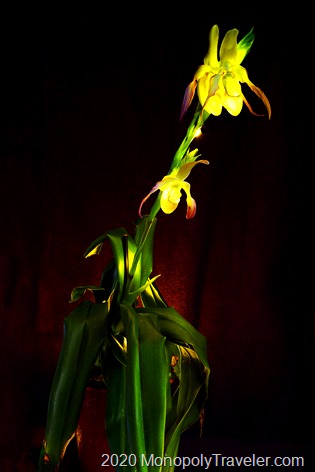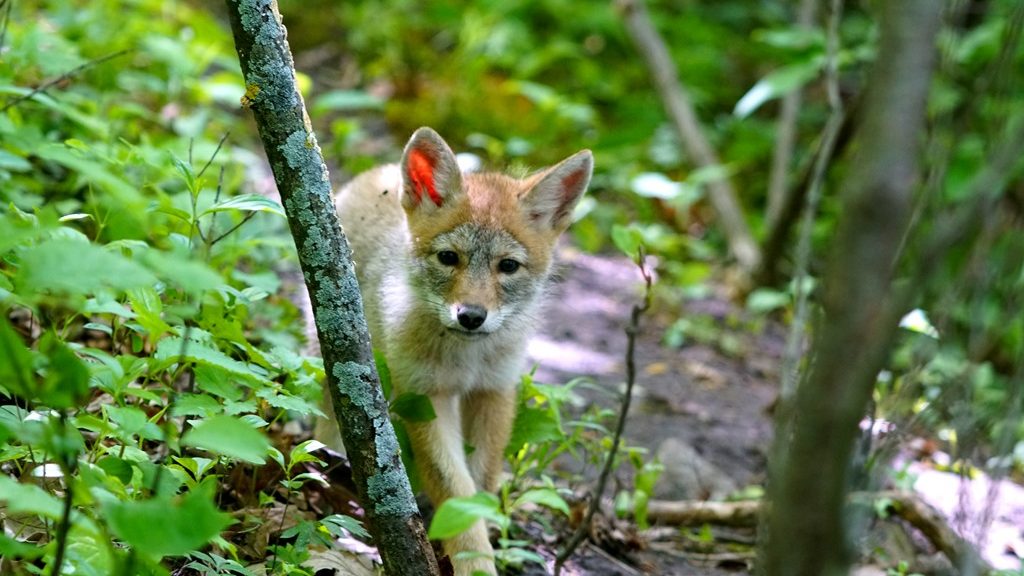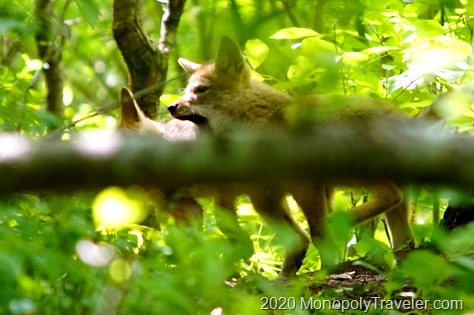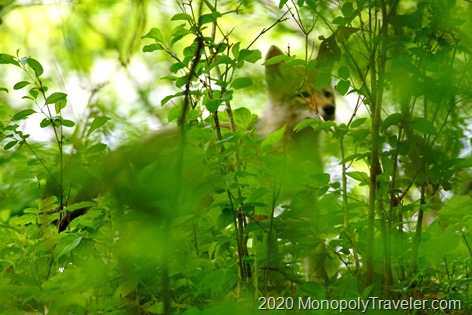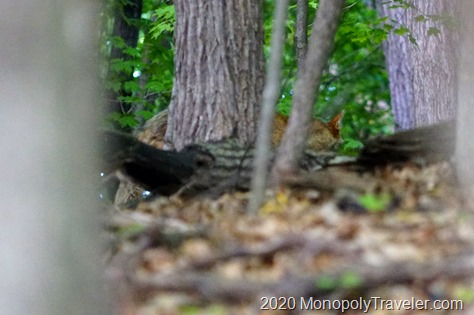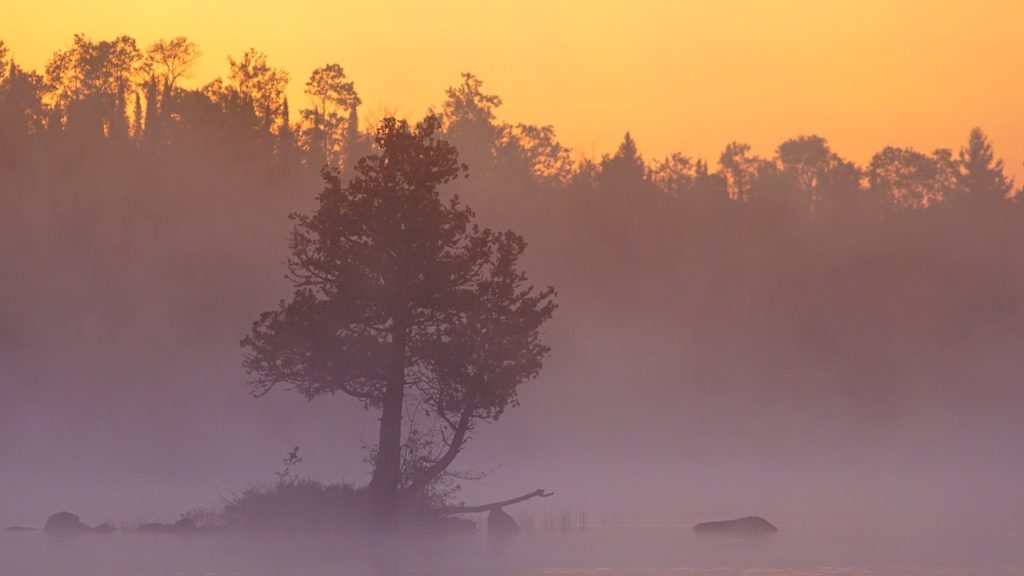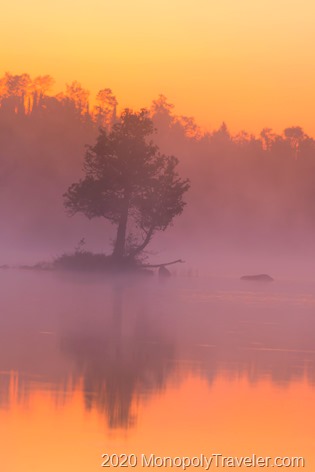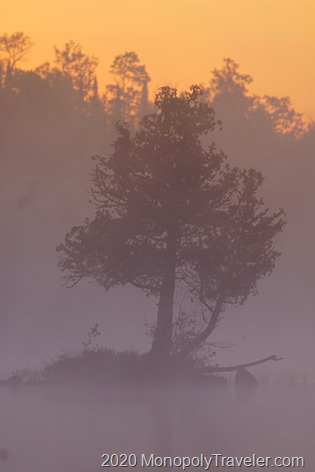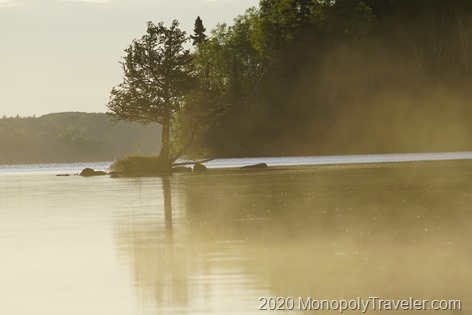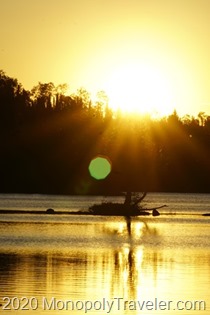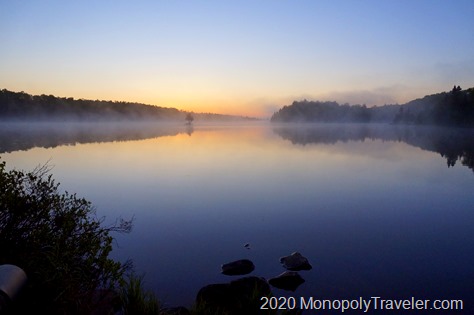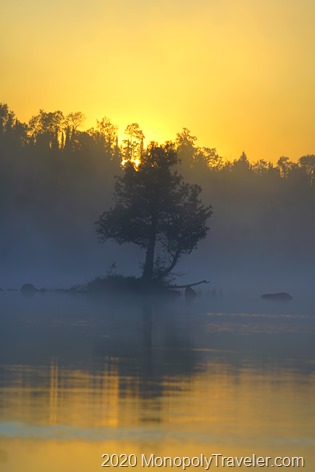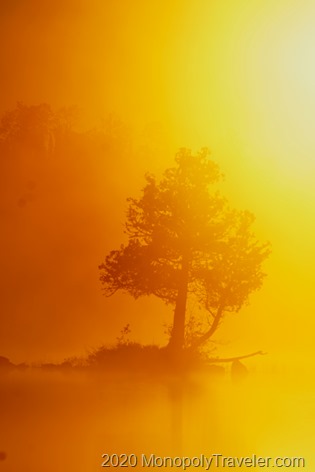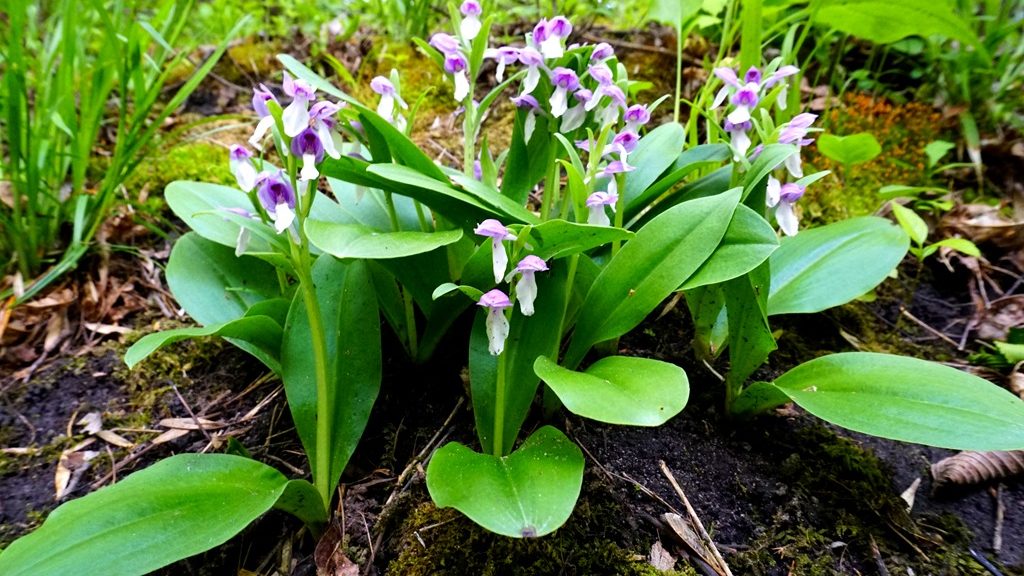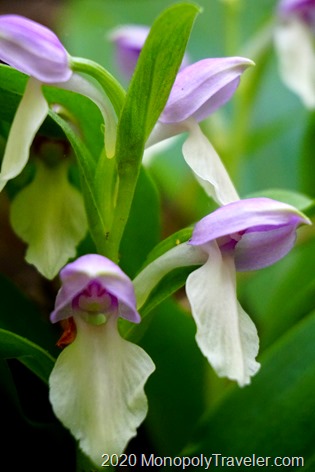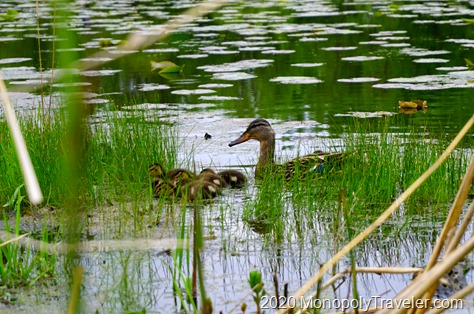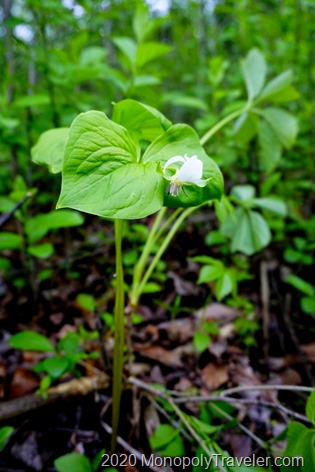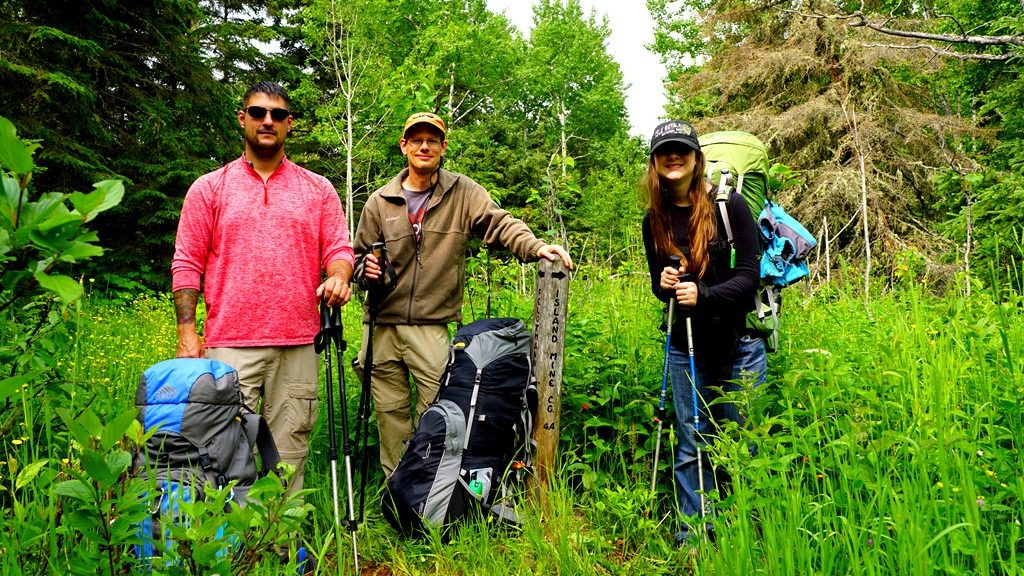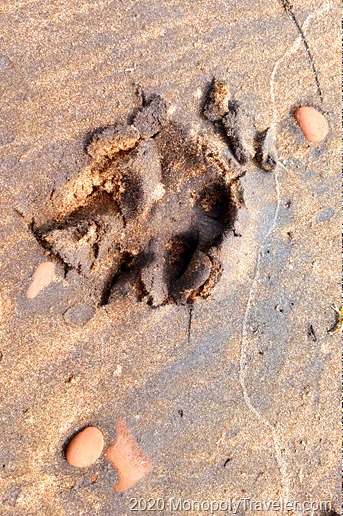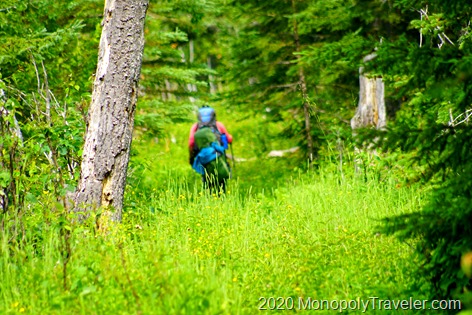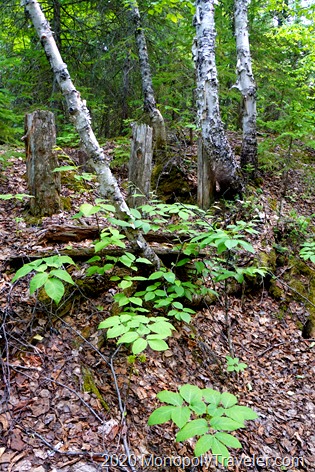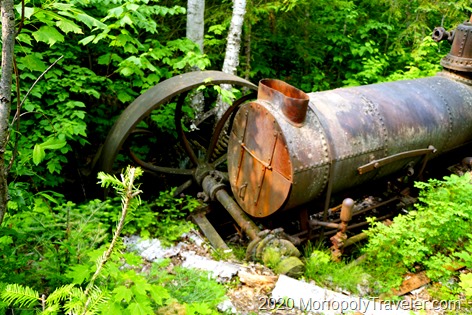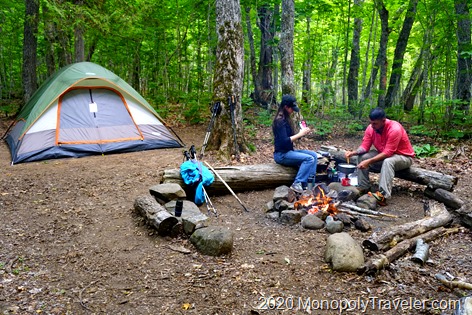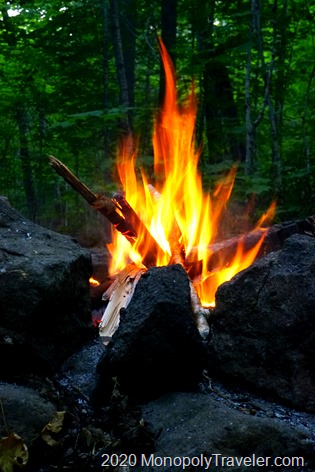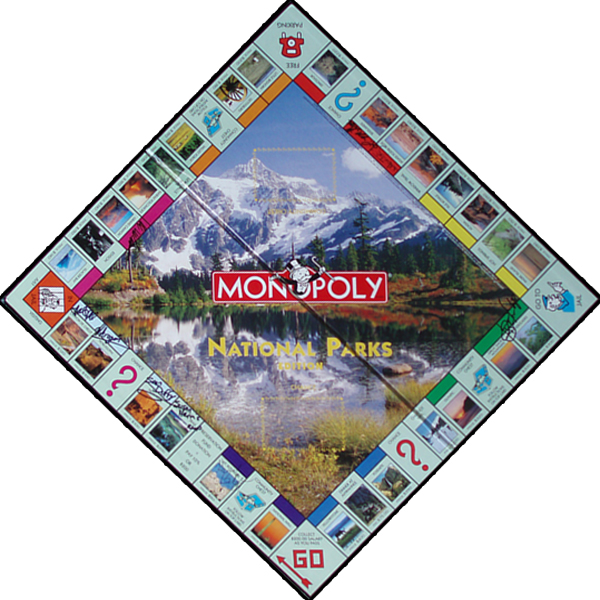One late spring night I decided to continue playing with the idea of photographing illuminated flowers. Since doing this with tropical lady slippers, I’ve wanted to try it with other flowers as well. The curiosity of how they might look at night lit from unique angles was in the back of my mind for several weeks while I waited for flowers to open as spring arrived. Once the sun started getting low in the sky I began to get set up with the camera, tripod, and remote shutter. Since the lighting is so low except for the LED light used to illuminate the flower, a slow shutter is necessary to capture what light there is. It has to be dark enough for the light to have an impact otherwise it will be overpowered by natural light. I do like how this turned out but I need to continue working on this type of photography. I always struggle with how to handle the lights. Do I tear a hole in the back of the flower to insert the light so the wires don’t show or are those wires small enough so as to be only a minor distraction? I like to hide them when possible without risking damage to the flower or plant itself. Something fun to work with when photographing flowers.
Category Archives: Travel Blogs
Finding a Few New Orchids
With the sun higher in the sky as the day approached noon, it was time to head into the woods and continue the search for more orchids. Along the way I spotted another plant that I didn’t know existed in Minnesota, Indian Paintbrush. While they are not orchids, they’re still amazing to see. These were growing near the roadside also and were growing in two different colors – orange and yellow. Stopping near some of these I got to examine their blooms more closely and discovered how beautiful they are with the green leaves tipped in either orange or yellow hiding their little flowers from view. Realizing I had been distracted by another beautiful flower, it was time to search for these orchids I came to find.
Talking with a local DNR employee earlier, he pointed me to a few locations to begin my search. Arriving at the first one I stepped out of the vehicle, grabbed the camera, and disappeared in the woods. Within a few minutes I came across some markings placed by other people and saw the little leaves they led to. It was the Calypso orchids holding their seed pods high above them. Unfortunately the blooms were done but it was still fun to find an orchid I had not seen before. If they were not marked I’m not sure I would have found them. Their single leaves are so small and grow very close to the ground. Once I spotted these I looked around and saw several others in the area. It must be beautiful in this place when they’re blooming.
While looking around at these Calypso’s, I began to slowly move forward a short distance when I spotted something else that appeared to be an orchid right as my foot was nearing the ground. Quickly shifting my direction, I almost lost my balance but managed to stay upright while avoiding stepping on this plant. Bending over to look closer, I realized it was another orchid. The flower stalk was growing but the flowers had not opened yet. I took a few pictures and continued exploring for more of these. After a little while I came across one of these orchids with the blooms open allowing me to get pictures of its blooms. Examining the flowers made me almost positive it was Platanthera hookeri. Eventually I confirmed that ID and added another new orchid to my found list. Slowly meandering through the woods I came across a few additional orchids past their bloom time. One was the early coral root which at first I thought was Corallorhiza odontorhiza. Further research confirmed that would be the Autumn coral root and what I actually found was the seed head of early coral root. Several of these were found in a few locations last year. The other new orchid was the Ram’s Head Ladyslipper. This was the one orchid at the top of my list to spot on this trip. Unfortunately the blooms were all done so there were just leaves and seed pods to see for this year. Another trip during their bloom period is in order. What a successful day of orchid hunting find 3 orchids I’ve never seen before! Now it was time to get some food.
Surrounded by Orchids
I’d heard about. I’ve even ready about it. But I was still completely surprised to be driving down a road and see the roadside exploding with beautiful ladyslipper orchids. In a portion of Northern Minnesota they grow as though a common weed. There were places these ordinarily rare hardy orchids would number in the hundreds. While these weren’t the orchids I was here to see, they were very impressive. The timing couldn’t have been better as they were in peak bloom. Having attempted on multiple occasions to grow this hardy orchid in my own yard without success, I now understood why I had such difficulties. They were never provided enough sunlight and water. With this newly understood knowledge, I’m ready to give it another try. It would be well worth it as beautiful as these orchids are. These conditions could never be duplicated in my yard so enjoying this environment was a must. I never got used to seeing these just growing by the roadside in many areas I traveled.
Often I stopped to get out and admire these beautiful plants and would notice other orchids mixed in with the Showy Ladyslippers. Occasionally the large yellow flowered cypripedium would be seen still in bloom. These usually are in flower a little earlier than the showy so I didn’t really expect to see them with such nice blooms and was pleasantly surprised from time to time. Another benefit of taking the time to walk along the road to inspect these wild orchids was to enjoy their subtle fragrance. I enjoy this nice, sweet scent but you have to get somewhat close to the flowers to smell it which can be an issue in their habitat. Often times they are growing in very wet places and this place has had above average rains at this point in the summer making it a bit more challenging to get near the blooms.
Slowly moving along the road, I caught the sight of another Cypripedium flower peaking out from the dense vegetation. It was the small yellow ladyslipper. Another orchid I expected to be done blooming by this time but here it was with some plants still in flower. Being certain this was a different species was a little challenging as it didn’t appear there was much difference between the large and small yellow ladyslipper. Coloration, size of bloom, and the tendrils provided hints that this was a third hardy orchid to be seen on this adventure. It was all so fun to find and worth battling the thousands of mosquitoes that also thrive in such habitat. While I was enjoying these ladyslippers, these were all orchids I’ve seen before and weren’t adding new ones to my list of Minnesota hardy orchids found. My count was still at 1 for this year.
While driving to another area where more types of native orchids were supposed to be growing, I came across a variation of the Showy Ladyslipper I haven’t seen before. An all white form. It was a matter of luck since it blended in so well with the numerous other Showy’s growing along the road while driving by. It didn’t add any new orchids to my list but was still fun to see. Unfortunately there was an area of loose dirt nearby which I suspect was someone digging out and poaching one of these more unusual protected orchids. They can be found for sale at several orchid growers which is the legal method of obtaining hardy orchids. The morning was beginning to turn towards noon and I had not seen any new orchids yet but what a nice start to my native orchid hunting adventure.
Isle Royale–The Last Hike
In 2019 I spent six days on Isle Royale National Park with my youngest daughter and one of my cousins hiking the Feldtmann Loop. We had spent the night in Island Mine campground enjoying the only official campground completely in the woods in this National Park. All of the others are near water. Fortunately mosquitoes weren’t as fierce as we originally feared they would be making for a more enjoyable night by our campfire. As daylight crept into the tent and began to light up the forest we began to move around preparing for our final day on the trails. There was excitement about getting to Windigo where there is running water and also hesitation to begin this hike knowing our adventure was nearing a close. All of our gear was now packed up. The last thing we needed to do was cover ourselves in bug spray hoping to reduce the amount of blood stolen from us during the next seven miles to complete our journey.
Doused in repellent, we hoisted our packs, grabbed the trekking poles and began our walk. Today’s path begins by a steep decline immediately followed by a steep incline to reach the next trail intersection leading to Windigo. Beginning the day with this type of terrain is a little difficult and demoralizing as you break out in a sweat right away with tiring legs quickly. As soon as we got to the intersection we dropped the packs and grabbed a snack along with water to recoup for a few minutes. This gave me time to set up the camera for trail pics to mark the beginning of our day surrounded by the beautiful forest. Regaining our legs and energy it was back on the trail knowing that it’s mostly downhill from here. Fortunately this is a relatively high point on Isle Royale.
We were moving at a fairly good clip by now after almost 30 miles of backpacking. Our bodies were adjusting to carrying all this weight allowing us to move faster and for longer stretches without a break. There were times we hiked at over 5 miles per hour which was a very good pace for us on this journey. And that was near the end of the hike. Not while we were fresh starting out. I enjoy hiking but not as much as exploring the areas we hike to. That’s the part I like most about backpacking – relaxing and wandering around in an area taking my time to notice the pieces that make up that place. Unique insects, wildlife, plants, and rocks. It seems most hikers are always in a hurry to get on the trail with the goal of putting in as much mileage as they can each day. I do like seeing the places I go through but I miss so many of the details while on the trail. The hike from Island Mine to Windigo seemed too quiet with very little wildlife moving about.
As we got closer to the end of the trail we encountered a group of hikers heading in the opposite direction. They said we were about a mile away as far as they could figure which was a great sound to our ears – almost there. Just another 20 minutes or so. Soon after they passed I looked at my phone, which was recording the hike, and saw we had closer to 2 miles left if my mileage was accurate. I didn’t really mind that they were off. I kind of knew we likely had more trail left than they indicated based on how long we’d been hiking. My expectation was to hike at 1.5 – 2.0 miles per hour (mph) including breaks which would take us 3 – 4 hours. In what seemed like no time at all we reached another trail intersection marking near the end of our journey. From here, we had hiked the trail on our last journey to Isle Royale National Park so it all should seem somewhat familiar. I was surprised to see we were moving at a pace of 2.6 mph with a top speed of over 5 mph which was close to the end of our hike. We arrived at the Washington Creek campground and immediately headed for the shelter we stayed at the last time we were here in 2012. Fortunately it was open and we quickly set up camp for the last time. Just then a loud splashing was coming from the water right in front of us. A moose had come to welcome us to Windigo (top photo)!
On the Hunt for More Orchids
With a goal to find 6 orchid species I had never seen before I headed to Northwestern Minnesota. Earlier in the spring I found one orchid, the Showy Orchis. Now to find five more. Daylight was just beginning to show in the morning sky. The summer solstice had come and gone the day before announcing a new summer season full of promise for native orchids. My car was packed the day before so all I needed to do was take a quick shower and load a few essential items along with my frozen food to begin another week long adventure. It was 4:30 am as I left the driveway for the 6+ hour drive which would end near the Minnesota – Canada border. Almost an hour later the sun began to fill the morning sky with a beautiful display of oranges, pinks, and purples. What a fantastic beginning to this journey!
While I continued to drive North, the sun climbed above the trees revealing a beautiful foggy morning landscape. This didn’t last very long as the fog dissipated quickly under the warm summer sun. There’s just something about a mysterious fog hovering above the ground that brings a smile to my face. What may be hiding in the mist that will be soon revealed as these clouds disappear? Over the next few hours the daylight grew bringing light to every corner I could see with the occasional deer grazing in a field off to the side of the road. As I got closer to my destination, Showy Ladyslippers began appearing near the roadside. Sometimes by the hundreds. I’ve seen pictures of this and read about it but that didn’t come close to seeing this for myself. Here are orchids growing like weeds in this area while they remain a specimen plant in most areas. Eventually I made it to my first stop along the way – Big Bog State Rec Area. And what adorned the entrance? Of course Showy Ladyslippers. Bogs are an eco system I’ve not seen before. Or at least realized I was seeing one. A bog provides a different sort of mystery with it. This place has a mile long bog walk so people can explore the area without getting wet and also destroying the plant life. As I walked along watching the forest transition to small black spruce trees surrounded by moss growing everywhere, I was hoping to see a Dragon’s Mouth, a Rose Pogonia orchid or pitcher plant but nothing.
Finally one of the clumps of living moss captured my attention. I think it was more the lichens growing on what seemed to be soil that caused me to pause along the boardwalk and kneel down for a closer look. As I studied these for a minute or two I spotted a small, interesting plant not far away. Immediately I recognized it as Sundew, another of Minnesota’s carnivorous plants. I needed to look a couple of times at this plant and its surroundings to finally believe that it what it really was. I was not expecting to see this plant here. Nor was I expecting it to be so small. Each leaf was only the size of a single chocolate M&M covered in tentacles each with a sticky sap at the end. The overall size of a single plant was equivalent to a small Lodge Pole pine cone. They are such interesting plants with a clear drop glistening at the end of each red hair. Once I spotted one, it was amazing how many more were growing in the green moss all around.
As I continued to inspect this little micro landscape I noticed several red berries which seemed to just grow out of the moss. Eventually this was identified as a bog cranberry and those were last years fruit. Nearby, this year’s flowers had just emerged to create next years fruit. I could see more and more fascinating pieces all growing together to make a bog. But still no orchids or pitcher plants. I continued to walk further into the bog when I finally spotted one. These beautiful red leaves emerging from the moss in the form of a pitcher full of water. Their colors and patterns combined to create a plant more interesting than much of its surroundings and contrasted beautifully with the moss growing around it. The further I walked, the more of them I began to see. It was such a treat. By this point the mosquitoes where making their presence well known. Occasionally after swatting one, I would carefully drop into a pitcher for the plant to consume. A bit of satisfaction for these irritating pests. I wished I could be there when these pitcher plants were in bloom. From pictures I’d seen the blooms where quite amazing and unique.
Studying a few of these fun plants, I turned around and saw what I didn’t expect to see. Pitcher plants in bloom. My research indicated they bloomed about a month earlier so I would not have the opportunity to see them on this trip. These dark burgundy blooms stood high above the moss covered ground showing off these beautiful petals. Scanning over the bog near the end of this walkway revealed blooming pitcher plants dotting the area. I could have stayed here for quite a bit longer photographing and studying the bog further but I had a mile long walk to get back and it was time to eat. Getting back to my vehicle, I grabbed a sandwich and an apple before continuing north to what would be my campsite for the night and base for the pending orchid hunt, Hayes Lake State Park. Stopping at Big Bog was definitely worth a few hours to begin this adventure!
Lighting Up Orchids
Orchids are a flower I really enjoy and recently one of my tropical ladyslippers began blooming again. This is a plant that has consistently bloomed every year for me and one I really enjoy. I’ve wanted to photograph them but my struggle has been how to create an image that is unique? Finally I came across the idea to light them in a unique way. From inside their pouch. With such small LED’s now this is possible in a way that hasn’t been before. My concern was the flower would get knocked off while inserting the lights. Fortunately that did not happen which surprised me a bit as I really had to twist and turn some of the parts of these flowers to get the lights where I wanted them. It took me a couple of hours one afternoon to get this all set up but I had fun and enjoy the results for the most part. There are hopes to be able to do more of this in the future with other flowers.
A Spring Afternoon Surprise
After completing some tasks around the house for much of the weekend I needed to get out to an area park and enjoy the sun’s warmth. A few days earlier I had found the first native orchids to bloom at one park. Now I wanted to locate it at my favorite park to go for some nearby solitude. A place I’ve spent hundreds of hours exploring. My plan was to hike some of the spots that seemed most likely for the Showy Orchis to grow. These would take a little bit to get to as they are over a mile away from the parking lot through the woods. It was ok as I had set aside the entire afternoon to conduct my search. After a few hours of looking without success, something moved just ahead of me. I was looking towards the ground off to one side and only caught this motion out of the corner of my eye. My mind registered something dark about the size of a cat. It was late afternoon and I was trying to figure out what would be moving this time of day at that size. Logically it must have been a squirrel which went up the tree appearing larger than it is. Returning to my search for this orchid I dismissed that movement as nothing unique. I was now on a lesser used trail which I discovered several years ago one late fall afternoon. Continuing forward on this little trail I noticed a patch of newly emerged grass which appeared to have been matted down and somewhat brown. That seemed strange for this time of year. Taking a few more steps I once again noticed movement but this time I saw what created it moving away from me. A PUP!
Soon after I saw it, it saw me and took off towards the other pups. It seemed unsure though of what I was. And then there was another walking on the trail right towards me. Fortunately my camera was out and ready now for a quick shot before this one also decided to take off. As I looked around I realized I was right in the middle of their den. My next action was to scan the surroundings for their mother. Coyotes typically will stay hidden unless their pups are in danger and here I was so close to their playground. While I didn’t see a full size coyote, I kept listening for any off sound while watching these pups scatter back and forth. What to do? I could find a nice spot and set up for possibly some better pictures as the pups would likely return in time or I could find an exit and continue on my search for orchids. I decided to move up near a log close by and wait for a little while. A couple of pups did come back and started to play briefly. They scattered again and I decided it was time to return to my hunt. After looking around I found the direction I wanted to escape from to try and reduce my impact on this place for these coyotes. I started walking in one direction and there was a pup right in front of me. I turned to go another way and there was another laying under a shrub. It seemed I couldn’t get out of their place without causing a disturbance. Finally I made it away after waiting a few times for the pups to find their way without me scaring them too much.
Finally I was back on the hunt for wild orchids in an area I haven’t spent much time in. About an hour after discoveries these pups I decided to take a rest and grab a little water. There was a nice log for me to sit on and set my gear next to while I enjoyed the peace and quiet of the woods. I was looking around to see the surroundings and what’s growing nearby when something caught my attention up the hill from me. Watching closely in the direction of the sound I soon saw an adult coyote. That seems weird for this time of day I thought. I was now quite far away from the den I found earlier. Wow, multiple coyotes in a single day? After thinking about this for a few minutes I realized what most likely happened. One of the parents had been stalking me for this entire time. Over an hour I was being followed. The only reason I saw it was because I stopped making noise for a long enough time causing it to search in the last spot it heard me. I was quite impressed with how nonchalantly it walked through the woods in sight. Like it didn’t even know I was there. It barely looked in my direction but a quick glance once or twice. I’m quite certain this is far from reality. It knew where I was and figured I was likely no longer a threat and retreated to the den area after being spotted by me. This coyote no longer had the edge of being hidden while following me. After thinking about all of this it became a little uneasy knowing I was being stalked for such a long time without hearing this coyote. Another humbling experience in the woods. Unfortunately no orchids were found on my adventures this afternoon but the pups were a more than adequate substitute.
Getting the Shot–A Boundary Waters Sunrise
This photo is so mesmerizing to me. Well, actually it’s the picture below that really captures my attention but that doesn’t work very well as the post photo because it’s in the portrait orientation. Fortunately I really like them both. The overall scene just appears so relaxing and calm to me. You have the fog lifting from the warm water into the cool morning air dispersing the soft morning light as the sun nears the horizon. That fog separates this lone tree from the forest behind it allowing you to see the interesting shape of this silhouetted evergreen growing from a tiny island surrounded by boulders and water. I really begin to wonder how this tree is able to grow in that spot. You have the cool colors created by the early morning low light and fog separating it from the warm colors above the tree line behind producing yellows and oranges. Having all of the trees in silhouette creates a scene that my mind keeps wanting to watch expecting the sun to show illuminating these trees and water.
The main difference in these two pictures above is, of course, the orientation in which they were shot. Switching to portrait allows for the trees reflection to become visible showing off the calm water adding to the relaxing scene. However, this photo doesn’t highlight the small island with boulders around it like the top picture does. Notice I did not center the tree, the main focus of this image. Is it obvious that the tree is the main subject? As I studied the tree I noticed a lower branch, or second tree, coming off the right side angling up adding a little more overall mass to this side. Because of that, it needed to be situated to the left in pictures. If I had centered this photo it would feel off balance to the viewer as you can see below. It’s not bad but it not as relaxed as the picture above. You can also see that making the tree fill the entire shot does not allow the viewer to step into the scene as well.
Looking at the top photos, it’s easy to think I just rolled out of bed and five minutes later captured these amazing photographs. Let me take you through what was involved in getting this shot. I arrived at this cabin on East Bearskin Lake. An entry point into the Boundary Waters Canoe Area. Taking a short path from the cabin to the waters edge and you’re looking out into the deep wilderness of evergreens, birch, maple, granite, and water. It’s so quiet most of the time. If it weren’t for the multitude of mosquitos, biting flies, and gnats it would feel like you’re in a dream. While first peering out at the landscape in front of me I saw this one tree emerging from a small island. I wanted to concentrate on that one piece and find a way to capture it’s interest separate from all the other incredible and scenic pieces putting together this spectacular place. There was just something about it that spoke to me. Prior to this I was struggling to find any motivation to even pick up a camera. There was just no excitement in photography which had been going on for a couple of months by this time.
I walked back to the cabin to begin unloading the camping gear and arranging it inside. Once complete, a meal was prepared with the intent the rest of the day to just enjoy quiet time with my friend I made the journey with. As we sat down to eat, rain began to fall chasing us inside for awhile. Not exactly the start I was hoping for but weather is to be expected during the spring in Northern Minnesota. From time to time my mind would return to the lake in front of us trying to envision what type of photograph would really bring out this tree growing almost from just out of the water? I struggled once again to come up with an idea and decided it was time for a fire and to let this picture go. My mental photography block was still in place. Maybe there just wasn’t a shot suitable using this little island and I should concentrate on something else. The stars began to shine overhead and it was a long day of travel so off to bed I went expecting to awake before dawn and try again.
Light began to show through the window just above my head. I was still tired and unmotivated to get up. After a few minutes of fighting with myself I got out of my nice, warm sleeping bag, begrudgingly got dressed and headed outside. The camera was in the vehicle and that’s where I wanted it to stay. But what if there’s a moose down by the lake? I grabbed the camera, a tripod, and a couple of lenses and headed to the lake just outside of this cabin. NO MOOSE! I should go back to bed. I decided to stay and work with composition on this lonely tree. You can see the results in the two photos above. Nothing really outstanding. I just couldn’t isolate this tree the way I really wanted to. The next morning I did this again, not really expecting anything more than just trying to enjoy the day beginning over this beautiful place. The second day I did spend some time moving down the shoreline a ways and noticed the difference in how that island appeared. It still was blending into the background too much but at least I could see water all the way around it now. Before the background trees blended in too well with a portion of it. I tried a small lens and moved all the way up to my 200-500mm lens looking for different compositions. Still no really good shot like I wanted. And my motivation to keep holding this computer with glass would not return. I should also mention that the camera was not working properly and the shutter button worked intermittently which may have been much of my problem.
On my third and final morning I once again forced myself out of bed and went down the the lake. What I found was a gorgeous scene! My inspiration returned immediately. I wrote about this some time back. You can read it here. If you click on previous post at the very bottom from that one you can read my description of this morning. The fog on the lake was perfect to create separation between the tree and the background. I moved on down the shore to where I had noticed water visible around the tree and set up the camera. You can see the view in the picture above. This tree was quite a distance away requiring my longest lens, which is visible in the lower left hand corner of the above shot, to accomplish the task I wanted. There were moments I needed to wait as the fog drifted around the tree to show off it’s interesting shape but for the most part I snapped away. Every few minutes the light kept changing as the sun continued to rise creating a slightly different look to the photograph. I couldn’t believe the colors in these pictures as I was taking them. They were just so amazing and made these pictures even more spectacular.
The sun began to peak through the tree tops behind this little island and the fog began to be disappearing causing me to believe my time capturing this scene, I had been trying for days to figure out, was over. And then it returned as the sun was rising above the trees casting a beautiful warm glow once again. I now switched the tree to the right side as it was no longer the main feature of the photograph. The sun and it’s rays going through the fog changed the scene. The brightness of the sun shining through this thick fog casting rays which protruded to the left of the tree now dominated the scene requiring me to adjust my composition slightly. The rays are subtle in this picture but are there which your eye picks up. It would feel out of proportion if the tree was still to the left of center now. It took three days and a lot of luck that the fog emerged for this picture to work. If I had not been focused on getting a photograph of this tree and the small island it was growing on, I would not have been prepared to capture this moment which only lasted a short time. These pictures have become inspirational to me whenever I go out to capture a scene now as they remind me a it becomes spectacular under the right circumstances as long as I’m prepared to photograph them.
And the Hunt for Orchids Begins
Near the beginning of this year I began to make a few plans this summer to search for more wild orchids. Last year I found 6 of Minnesota’s wild orchids and my goal this year is to add 4 more. That would make 25% of Minnesota’s native species of orchids. While formulating places and times to search for some of these, the Showy Orchis was on my list for a couple of reasons. First, it’s the earliest of wild orchids to bloom. Secondly, it’s supposedly blooming within 10 minutes of my house making it an easy one to add to the list. Memorial Day weekend was my plan for searching for blooming orchids. A couple of weeks earlier I began scouting possible locations for this species which I briefly wrote about in A Cold Mid May Morning. Then a few days later I heard they were found at the very same park I was searching at before. Unfortunately I had to end my search the week before as there were things that needed to be done. So I returned and continued to the location I was heading for initially and there they were. If I had been able to keep going I would have found them as they were beginning to open their beautiful pink and white flowers with a addicting sweet fragrance.
Unfortunately it was a cloudy night with daylight fading so capturing these first orchids of the year would be more of a challenge. I still took time to photograph them just in case this would be the only time I see them this year. I found a cup nearby which someone had dropped or lost and used that as a makeshift tripod and began clicking away trying to find the best composition to show their interesting flowers. After some time I moved on just to see if there were populations in other areas wondering how well established they were in this park. Unfortunately that was the only spot I managed to find the Showy Orchis on this trip but I did find a couple of other fun things.
One of these was mamma duck escorting her newly hatched little ducklings around the edge of a pond. Staying and watching for more time would have been a lot of fun but my goal was to find orchids, not baby ducks so I moved on. Along the way I also came across Nodding Trillium which was a little surprising to me. Trillium is one of my favorite spring wildflowers and one I’m working on establishing in my own yard. Both of these findings help identify when the Showy Orchis is most likely blooming. The calendar is great but it doesn’t take into account the differences in spring weather which affect plant growth and blooming time. Having some other indicators can be quite helpful for a higher probability of success. Off to a good start! I hope my next wild orchid hunt returns the success I’ve experienced already.
Isle Royale–Headed to Island Mine
Last summer my daughter Kris, cousin Chad, and I went to Isle Royale on a backpacking adventure. I’ve written posts on the first part of that trip from Windigo to Feldtmann Lake and onto Siskiwit Bay previously. This is a continuation of our experience on the island.
After a full day of resting and enjoying the area around Siskiwit Bay it was once again time to pull on our packs and head out. The destination was Island Mine Campground which was only 4 1/2 miles away but we decided to get an early start to the day. Mosquitoes could be bad there and if that’s the case we wanted enough time to continue hiking on towards Windigo. Camping in a mosquito infested area is not that fun as the safest place is inside a tent after killing whatever insect followed inside. Spending an afternoon swatting these pests was not our idea of fun so we wanted to give ourselves the opportunity to keep going in daylight if necessary. If we hiked at our average pace we should be there in 3 hours, 4 if we really take our time. That would still give us enough time to continue the 6 1/2 miles to Windigo and arrive before dark.
The first two miles of the hike are along the shore of Siskiwit Bay. Half of those two miles are along the beach. While navigating the beach and trying to stay dry from waves washing up on shore, we came across fresh wolf prints in the sand. This must have been the wolf cry we heard the night before. These were recent because we had walked this same beach the day before and there were no wolf tracks in the sand at that time. By this time we had seen everything but a wolf itself. There was a kill and scat on the way to Siskiwit Bay, a howl in the night, and now the tracks. Seeing an actual wolf would have been amazing but to see all of these signs and hear one was more than I expected so I was quite satisfied just to know they were near.
Making our way around the bay, we came to a place with a sharp left turn. This will be the last view of Lake Superior for the next day as our next campsite will be in the middle of the Island. The trail slowly begins to ascend as we moved inland and the mosquitoes seem all to happy to welcome us back to the woods. Dowsing ourselves in bug spray, these irritating pests added motivation to keep moving with their constant hum as they searched for any little spot without repellant on it to steal blood. After seeing so many moose near the previous camp sites, we were always on the lookout for one that may pose danger on the trail. This can be a challenge because you also have to keep your eyes on the trail lest a rock or root jump up from the ground and trip you. Falling on the trail with all of that extra weight on your back is a good way to get the air knocked out of you or twist your ankle. Not something we wanted to experience during this adventure.
It seemed like a very short time, but we had hiked for a couple of hours when we came upon the abandoned mine this area is labeled after. Large piles of tailings highlight the entrance with few plants covering them even after a century of closing. Walking over these first piles you begin to see equipment left here from a long time ago. In one are there was something built that could have been a mine shaft or storage facility which you can see in the photo above. Many of the pieces have been weathered over the years bringing a further authenticity to this historic site. We spent nearly an hour exploring this old operation imagining how things were done from the placement of the equipment, tailings, and excavation locations. It was fun to be able to take our time looking over this site and imagine the people and how they worked here, even for a short time wondering if this would have been something I would have enjoyed doing back in the day.
With a little under a mile to go, we got back on the trail heading towards the campsite a little under a mile away. The remaining hike continued through a mature forest of maples, firs, and aspen up and down hills. What a sight this area must be in the fall as the trees explode in reds, oranges, and yellows preparing for winter. Eventually we came to a creek crossing with a steep hill to climb. The hill would be a bit of a challenge anyway but with all of our extra weight it was even more daunting. With the aid of small trees to help with the climb we made it to the top and saw the sign laying out the campsites. We’re already here we thought? And at the same time had a sigh of relief to be able to pull the packs off and set up camp. We were the only ones at this campsite, for now. Before getting too much pulled out of our packs we took a little time to feel out the bug situation. How bad were the mosquitoes? Do we continue on to Windigo or are they tolerable enough that we can stay as planned?
There really weren’t many mosquitoes in this location and water was available a short distance away so we decided to spend the night in the only campsite on Isle Royale that isn’t near water. And one of the few that allow fires. The tent was excavated from a backpack and quickly set up with sleeping bags and pillows and most of our gear stored for the night. We gathered wood to start a fire and began cooking our main meal of the day. While hiking the meals consist of trail bars, trail mix, and whatever else is in a bag for snacking but when in camp we cook something more substantial to aid in recovering from a strenuous journey on the trail. While eating, the quietness of the woods begins to settle in and you realize you’re alone as no other hikers had come through while we’ve been in camp. We could yell at the top of our lungs and no one would be able to hear us. It was possible the closest people to us were more than 4 miles away. Both comforting and disturbing! Thoughts quickly shifted to our time together in this beautiful place as we have just one more hike to bring this incredible adventure to an end.
Previous posts of this trip:

